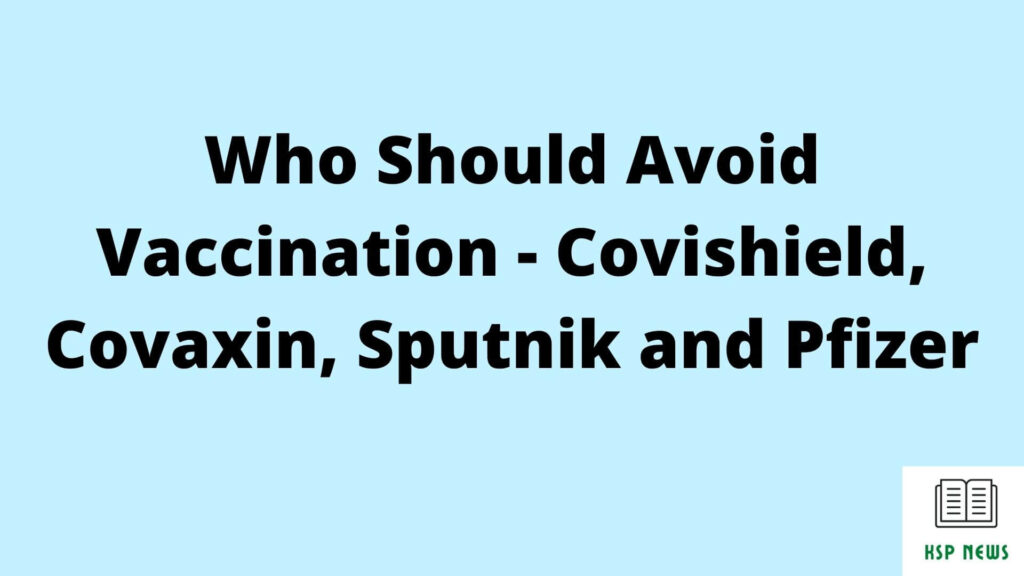Who Should Avoid Vaccination? — Information on the Covishield, Covaxin, and Sputnik vaccines is the subject matter of this article. We will try to cover the details regarding the precautions that you must take while opting for the vaccination of Covid-19.
We will inform you which vaccination is ideal for you or which vaccine should be administered and provide a detailed explanation. I hope you all take the time to read it thoroughly and remain in touch with us for more information.
If you are interested to know the latest development regarding the Covid-19 vaccine booster dose, let us tell you that Government of India is yet to take any decisive stance regarding the same.
Who Should Avoid Vaccination
Table of Contents
Unfortuntely many individuals die each day as a result of coronavirus. Keep in mind that vaccines are being developed and hope that you, too, will have your jab taken as soon as possible. Approximately 136 million individuals in India have received the covid vaccination till mid December 2021. There have been two waves of coronavirus, which have killed a large number of people, and now a third wave of Covid-19 is expected, which is thought to be extremely harmful. It is stated that by receiving the vaccination, the risk of contracting coronavirus is considerably decreased, and that a total of two doses of the vaccine must be given at different times.
Currently, India is administering four vaccines: Covaxin, Covishield, Pfizer, and Sputnik. The Sputnik vaccine has arrived in India and many people have received it; the government has said that the third wave will be extremely risky for anyone aged 18 years and older, which has caused widespread outrage. According to the results, Sputnik is around 92% effective against covid-19, and similarly, the effectiveness of the remaining vaccines is clearly stated below; please read it carefully.
Who Is Right Candidate for the Covid Vaccine and Who’s Not?
We will inform you here Who Should Avoid Vaccination and who are perfectly fine to proceed with; please read the following points carefully:
- Pregnant women cannot get this vaccination due to the significant risk of complications.
- Additionally, this vaccination is also safe for those who have diabetes, asthma, liver illness, chronic infections, hypertension, or renal disease, among other conditions.
- Nursing mothers can get these immunizations and then continue breastfeeding.
- Individuals allergic to foods, insects, environmental triggers, or animals, for example, can obtain their immunisation without much fear.
- Individuals with extremely low platelet counts should use this vaccination with extreme caution.
- Individuals who are allergic to a component of the vaccination should also avoid the immunisation process.
- Individuals who are considering having children can also receive this vaccination.
- There is a little danger associated with taking this vaccination for vulnerable and elderly individuals, so proceed with caution; you may even develop a mild disease as a result of this vaccine.
- Those who have been cured of covid-19 and have previously had covid can also obtain the vaccination easily.
- Youngsters can also receive this vaccination; the Pfizer vaccine is recommended for children ages 12-15.
- Additionally, children should be vaccinated only when absolutely essential, as vaccinations for all boxes have not yet been distributed.
- Additionally, women might receive the Covid-19 vaccination throughout their menstrual cycle.

Who should Avoid Covishield Vaccine
Covishield is included among the first two vaccinations chosen by the Government of India. This dosage was developed by Oxford University in collaboration with AstraZeneca; it is also used in Europe. It is manufactured by the Serum Institute of India in Pune, and the government has decreased the price to Rs.300/- for private facilities whereas it is administered in government facilities for free. Following vaccination, this vaccine activates your immune system, causing it to produce antibodies against the virus.
In 2020, the vaccine proved to be 70.4 percent effective, according to Internatium clinical studies conducted in the United Kingdom and Brazil on 11,633 participants. After consuming both dosages, it is seen to have a 90% impact. Following vaccination, you may suffer discomfort, warmth, redness, soreness, swelling, and itching, which occurs in around 1 in 10 people.
Additionally, you may have fever, fatigue, headache, chills, or joint discomfort following the immunisation. The consequences, which occur in approximately one person out of every hundred, include abdominal discomfort, loss of appetite, dens or excessive perspiration, and others. We recommend that you take paracetamol following the immunisation; it helps alleviate discomfort. Cowshield’s vaccination must be stored between 2 and 8 degrees Fahrenheit and is administered in two doses four to twelve weeks apart.
Who should avoid using Covaxin?
The government provides this vaccination for free while private hospitals provide it for Rs.1410/-. Covaxin vaccine is manufactured by India through the ICMR and the National Institute of Virology. It was authorised in an emergency in January. After receiving this vaccination, your body begins producing antibodies against covid-19, lowering your risk of contracting coronavirus. This vaccination is believed to have an 81 percent effectiveness rate.
There are several possible adverse effects of this vaccination, including discomfort following the injection, redness and stiffness in the top portion of your hand, itching at the injection site, body soreness, weakness in the hand, fever, rash, vomiting, malaise, and nausea. However, not all of them must have the same side effects; they may or may not be of a distinct nature. You must receive two doses of this vaccine within a 28-day period for it to be fully effective.
Who Should Avoid The Sputnik V Vaccine
Two doses of this vaccination are administered at a 21-day interval, and its full impact is not obvious until both immunizations are taken. This vaccination induces the production of antibodies against coronavirus in our bodies, significantly reducing the risk of contracting coronavirus. This is a cold-type viral vaccination that infects your body with microscopic pieces of SARS-CoV2. So that it has a complete impact on your body and does no harm.
These vaccines are kept between 2 and 8 degrees Fahrenheit to facilitate transit to India. The vaccine’s efficacy is stated to be 91.6 percent, which is comparable to Moderna and Pfizer’s efficacy of 95 percent, which is comparable to Sputnik. Following vaccination, you may experience a small fever, which will make you more efficient against this virus and may be readily treated with paracetamol. Currently, no particular side effects of this vaccination have been identified.
Also Read:
CoWIN Covid-19 Vaccine Registration
Covid-19 Vaccine Booster Dose – Everything Explained
How to Download the Cowin International Travel Certificate
Vaccine Registration For Children Over 12 Years Old
Plan for Covid-19 Vaccines for Children
Who Should Avoid The Pfizer Vaccine?
After receiving the Pfizer vaccine, it is 95% effective against covid-19; this is after receiving both doses. Due to the fact that this effect occurs in all subsequent individuals, this vaccination is regarded to be extremely successful. However, due to a storage issue in India, this vaccine is rarely utilised. This vaccine is of the mRNA kind, which we keep at temperatures ranging from -80°C to -60°C for a maximum of five days. Two doses of this vaccine are administered, and no information on its cost has been obtained.
We hope you found our post comprehensive; if you have any questions concerning Who Should Not Take Vaccine, you can write us in the comment box and we will respond promptly.
Latest Covid News:
